|
|
|
Sort Order |
|
|
|
Items / Page
|
|
|
|
|
|
|
| Srl | Item |
| 1 |
ID:
093179
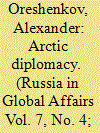

|
|
|
| 2 |
ID:
147230
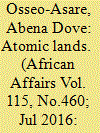

|
|
|
|
|
| Summary/Abstract |
The presence of a low-power 30 kW nuclear reactor at the Ghana Atomic Energy Commission (GAEC) in Kwabenya, a suburb of Ghana's capital city Accra, has exacerbated longstanding disputes over access to land there. The reactor complex has a five km radius of empty land as a buffer zone, but neighbouring residents have reclaimed what they perceive to be fallow land. An estimated 30 percent of the 2,000 acres of GAEC land has been lost to squatters and resale by families from Kwabenya, Haatso, and other nearby towns. This article traces the history of land disputes at Kwabenya from the earliest court records in the early twentieth century, through the expropriation of GAEC lands in the 1960s under President Kwame Nkrumah, to recent tensions after Ghana imported the reactor in 1994. A historical analysis of Atomic Lands in Ghana shows how competing interpretations of an exclusion zone may compromise nuclear security in African countries. The analysis is based on testimonies from court records, media reports, and extensive oral history interviews with residents, physicists, and entrepreneurs in Kwabenya. Their stories indicate that the Commission increasingly uses the potential of radiation on their properties to outmanoeuvre family claims to land. As Ghana and other African countries expect to expand their nuclear capabilities, a history of property disputes near one of the first nuclear programmes on the continent demonstrates the challenge of managing atomic lands.
|
|
|
|
|
|
|
|
|
|
|
|
|
|
|
|
| 3 |
ID:
138241
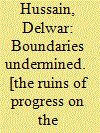

|
|
|
|
|
| Publication |
New Delhi, Oxford University Press, 2013.
|
| Description |
xvii, 187p.Hbk
|
| Standard Number |
9780199459407
|
|
|
|
|
|
|
|
|
|
|
|
Copies: C:1/I:0,R:0,Q:0
Circulation
| Accession# | Call# | Current Location | Status | Policy | Location |
| 058200 | 320.125492054/HUS 058200 | Main | On Shelf | General | |
|
|
|
|
| 4 |
ID:
178655
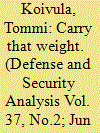

|
|
|
|
|
| Summary/Abstract |
This article proposes Stephen Jay Gould’s concepts of time’s arrow and time’s cycle as a conceptual tool to analyse NATO’s burden-sharing disputes. It argues that the controversies on burden-sharing in NATO can be assessed in terms of their cyclic or arrow kind nature, rendering some disputes more likely to recur than others and providing different kinds of starting points for their forecasting. The study identifies four cyclic categories in which burden-sharing has transformed into a political debate among NATO members during the post-Cold War era: geopolitical change related to Russia; periods of US foreign political retrenchment or renewal; the passivity or activism of European NATO members; and during NATO or allied out-of-area operations. Moreover, the study suggests an arrow kind of direction in burden-sharing disputes, indicating an expansion of disputes to cover comprehensive security, resilience, security co-operation and diplomacy, and to engulf also NATO partner countries.
|
|
|
|
|
|
|
|
|
|
|
|
|
|
|
|
| 5 |
ID:
104018
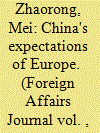

|
|
|
|
|
| Publication |
2010.
|
| Summary/Abstract |
Since the establishment of diplomatic ties 35 years ago, China and the EU have seen their relations evolving from constructive partnership to comprehensive partnership and then to comprehensive strategic partnership. The continuous evolvement fully shows that China-EU relations are strategic, comprehensive and stable, which is jointly recognized by both sides. However, there still remain a number of disputes and differences between the two sides. This is inconsistent with the spirit of comprehensive strategic partnership. Both China and the EU should take a strategic, global and long-term perspective to manage their bilateral relations, and keep pace with the times to further the development of future relations on the right course.
|
|
|
|
|
|
|
|
|
|
|
|
|
|
|
|
| 6 |
ID:
082407
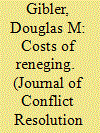

|
|
|
|
|
| Publication |
2008.
|
| Summary/Abstract |
Reputations are supposed to matter. Decision makers consistently refer to reputations for resolve, and international relations theories confirm the value of being able to credibly signal intentions during times of crisis. However, empirical support for the effects of reputation has been lacking. Problems of strategic selection have hampered previous quantitative tests, and the qualitative literature provides scant support for the concept in individual crises. In this article, the author shifts the focus from crisis behavior to alliance commitments and examines the effects that opportunities to uphold previous commitments have on future alliance commitments and conflicts. The results demonstrate that alliance reputations do affect both alliance formation and dispute behavior
|
|
|
|
|
|
|
|
|
|
|
|
|
|
|
|
| 7 |
ID:
131958
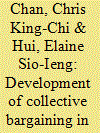

|
|
|
|
|
| Publication |
2014.
|
| Summary/Abstract |
2010 was a turbulent year for labour relations in China. The wave of strikes sparked by the Honda workers has highlighted the urgent need for trade union reform and workplace collective bargaining. In response to this turbulence, the Chinese government has stepped up efforts to promote the practice of collective bargaining, which had been neglected under the existing "individual rights-based" labour regulatory framework. In the midst of rapid social and policy changes, this article aims to examine the effect of labour strikes on the development of collective bargaining in China. The authors argue that, driven by growing labour protests, the collective negotiation process in China is undergoing a transition, from "collective consultation as a formality," through a stage of "collective bargaining by riot," and towards "party state-led collective bargaining." This transition, however, is unlikely to reach the stage of "worker-led collective bargaining" in the near future.
|
|
|
|
|
|
|
|
|
|
|
|
|
|
|
|
| 8 |
ID:
119324
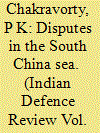

|
|
|
| 9 |
ID:
137719


|
|
|
|
|
| Summary/Abstract |
We do not yet have strong evidence that the rally effect motivates domestically vulnerable leaders to become engaged in international conflict. We draw upon mechanism design to argue that, if anything, diversionary incentives should be associated with a greater likelihood of being the target of disputes, though the conditions under which the result obtains are restrictive. Our analysis of all dyad-months involving the United States and its rivals for the period from 1956–1996 yields suggestive evidence of the unconventional behavior anticipated by our model, while failing to find evidence of patterns anticipated by either traditional diversionary accounts or strategic conflict avoidance. These results suggest that if we are to better understand international conflict by focusing on diversionary incentives, which may not be very useful, we should focus on the behavior described by our formal model rather than that anticipated by either traditional diversionary accounts or strategic conflict avoidance.
|
|
|
|
|
|
|
|
|
|
|
|
|
|
|
|
| 10 |
ID:
179109
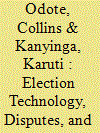

|
|
|
|
|
| Summary/Abstract |
In Africa, many countries have adopted technology in the conduct of elections so as to improve efficiency and deter malpractice. However, electoral disputes and violence continue to recur even where elections involve use of technology. This article builds on a case study of Kenya to show the limitations of technology use in elections. We argue that use of election technology does not guarantee the credibility of elections; technology has become a ‘black box’, which competing parties exploit to either play victim or declare themselves winners. The paper concludes that election technology is the new frontier for fraud. The manner in which election technology is procured, deployed and utilized is not only technical but also political. Addressing this political problem is imperative to avoid political violence around elections.
|
|
|
|
|
|
|
|
|
|
|
|
|
|
|
|
| 11 |
ID:
074672
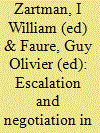

|
|
|
|
|
| Publication |
Cambridge, Cambridge University Press, 2005.
|
| Description |
ix, 334p.
|
| Standard Number |
0521672619
|
|
|
|
|
|
|
|
|
|
|
|
Copies: C:1/I:0,R:0,Q:0
Circulation
| Accession# | Call# | Current Location | Status | Policy | Location |
| 051864 | 327.17/ZAR 051864 | Main | On Shelf | General | |
|
|
|
|
| 12 |
ID:
178069


|
|
|
|
|
| Summary/Abstract |
Political relationships and not the economic benefits of cooperation, guides India and Pakistan to take their respective stands on the hydroelectricity projects on the Indus River System. Therefore, almost all hydroelectricity projects on their shared river system have been strongly contested by one or the other riparian states. In recent years, the two countries have engaged in disputes on the Kishanganga Hydroelectricity Project on the Indian side of Jammu and Kashmir. Despite clearance by the Court of Arbitration in 2013, Pakistan raised other technical objections with the project. This article looks at India-Pakistan hydroelectricity issues, examines politics over the water and hydroelectricity projects, and analyzes difficulties in moving to a non-state centric approach.
|
|
|
|
|
|
|
|
|
|
|
|
|
|
|
|
| 13 |
ID:
187092


|
|
|
|
|
| Publication |
New Delhi, Diamond Pocket Books (P) Ltd, 2022.
|
| Description |
110p.hbk
|
| Standard Number |
8128817663
|
|
|
|
|
|
|
|
|
|
|
|
Copies: C:1/I:0,R:0,Q:0
Circulation
| Accession# | Call# | Current Location | Status | Policy | Location |
| 060228 | 923.2/PAN 060228 | Main | On Shelf | General | |
|
|
|
|
| 14 |
ID:
120962
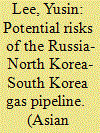

|
|
|
|
|
| Publication |
2013.
|
| Summary/Abstract |
This paper analyzes the potential risks of the Russia-North Korea-South Korea (RNS) gas pipeline, comparing it with the Russia-Ukraine-Europe (RUE) pipeline. I argue that the possibility of disputes is much higher in the RNS case. Furthermore, I propose that the South Korean government opt to import liquefied natural gas by ship directly from Russia if contingency plans in the case of gas supply disruptions in the RNS pipeline are not available.
|
|
|
|
|
|
|
|
|
|
|
|
|
|
|
|
| 15 |
ID:
105900
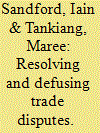

|
|
|
|
|
| Publication |
2011.
|
| Summary/Abstract |
Disagreements are a natural and inevitable part of any substantial relationship. This is particularly true in the area of international trade, where national interests and the domestic commercial objectives with which they are closely aligned often come into conflict with the interests of trading partners. Because disagreements are inevitable, trade agreements usually provide a framework for resolution of disputes. However, the typical dispute settlement framework established in trade agreements seldom captures the imagination of the business community. Indeed, public international law frameworks for trade dispute settlement tend not to be used for anything other than disputes of the largest magnitude or where there is a deep political issue that is otherwise insoluble. This article argues that such an approach to the crafting of dispute clauses in trade agreements is a missed opportunity. It suggests that, in the context of the relationship between Australia and the European Union, there is potential to develop a range of different approaches to address problems in an effective and accessible manner.
|
|
|
|
|
|
|
|
|
|
|
|
|
|
|
|
| 16 |
ID:
142034
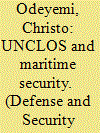

|
|
|
|
|
| Summary/Abstract |
This Critical Comment seeks to situate the United Nations Convention on the Law of the Sea (UNCLOS) within the context of South China Sea (SCS) dispute. Bearing in mind that maritime actions of the main disputants – China, Vietnam, and the Philippines – increasingly “securitise” these long-standing disputes and vice versa, the study examines the concept of a maritime “regime complex.” Whereas efforts have being made to examine UNCLOS and indeed the dispute within the framework of a maritime “regime complex,” the key finding shows that the increased “securitisation” of the disputes makes it difficult to envisage effective engagement of UNCLOS as a resolution mechanism. It will also reveal that China's firmly established expansionist agenda in the SCS region is indicative of Beijing's susceptibility to compromise a diplomatic solution to these long-standing disputes. These discoveries are structured around the knowledge that the spatial relation of the SCS critically espouses not only its geo-strategic significance in terms of natural resources endowment, but also the enduring maritime disputes within the region.
|
|
|
|
|
|
|
|
|
|
|
|
|
|
|
|
|
|
|
|
|